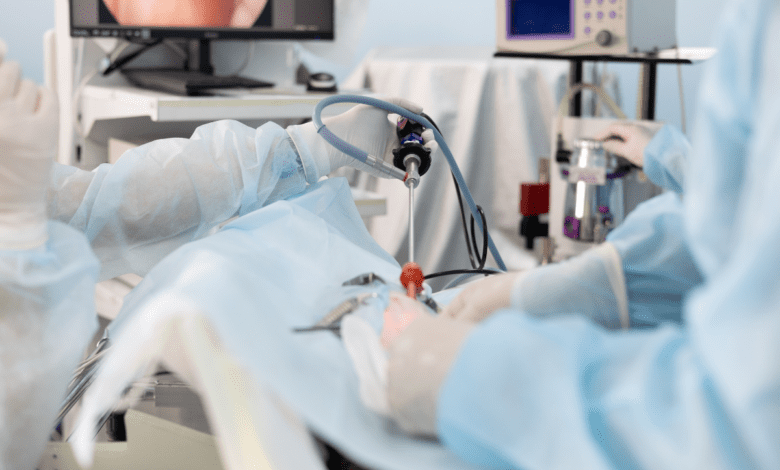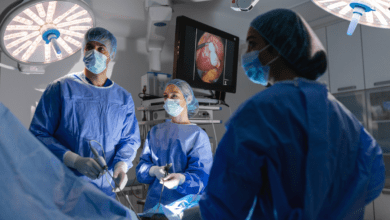Innovations in Gastric Bypass and Obesity Management

Innovations in Gastric Bypass are rapidly transforming the landscape of weight loss surgery. No longer are bulky procedures the only option. Today, cutting-edge techniques and artificial intelligence (AI) are making weight loss surgery safer, more effective, and even personalized.
This guide will delve into the latest breakthroughs in gastric bypass, explore how AI is revolutionizing obesity management, and unveil other exciting advancements in weight loss surgery technology.
Latest Gastric Bypass Techniques
- Robotic-Assisted Gastric Bypass: This is one of the coolest new developments in surgery. Surgeons use robots to help perform the procedure with amazing precision. The robots make smaller cuts, which means less pain and faster recovery for patients. Surgeons control these robots from a console, which gives them more flexibility and control than traditional methods.
- Single Anastomosis Gastric Bypass (SAGB): Also known as mini-gastric bypass, this technique simplifies the surgery by creating just one connection between the stomach and intestines, instead of two. This means a shorter operation time and good results in terms of weight loss and fewer complications.
- Endoscopic Sleeve Gastroplasty (ESG): ESG isn’t exactly a bypass, but it’s a new, less invasive option. Surgeons use an endoscope to put stitches in the stomach, making it smaller. This method is less invasive than traditional surgery, leading to fewer complications and quicker recovery.
Innovations in Gastric Bypass
Recent innovations focus on making gastric bypass surgeries safer and more effective. Advanced imaging techniques, like 3D imaging and intraoperative navigation, help surgeons plan and perform these procedures with better accuracy, reducing risks and improving long-term results.
Obesity Management with AI
AI is becoming a big deal in managing obesity. It helps by analyzing tons of data to create personalized treatment plans and improve surgery outcomes.
- Preoperative Assessment: AI looks at patient data—like medical history, lab results, and images—to evaluate risks and predict surgery outcomes. This helps surgeons tailor their plans to each patient’s specific needs.
- Intraoperative Assistance: During surgery, AI provides real-time guidance. It monitors vital signs and the surgical environment, alerting the team to any potential issues, which helps avoid complications.
- Postoperative Care: AI also helps after surgery by tracking recovery. Apps and wearable devices monitor vital signs, activity, and diet, providing useful insights for both patients and doctors to ensure a smooth recovery.
New Technologies in Weight Loss Surgery
Imagine this: a weight loss surgery that’s as cutting-edge as your latest smartphone. That’s the reality with the latest innovations in gastric bypass! These advancements aren’t just about shrinking incisions (though smaller scars are a nice bonus). They’re about making the entire procedure safer, more effective, and tailored to your unique needs.
Beyond AI, several new technologies are making weight loss surgery even better:
- Enhanced Visualization Tools: High-definition cameras and advanced lighting give surgeons a clearer view during laparoscopic surgery, improving precision and reducing errors.
- Advanced Stapling Devices: These new stapling devices are more precise and reliable, adapting to different tissue types and thicknesses to ensure secure closures and reduce the risk of leaks or bleeding.
- Telemedicine and Remote Monitoring: Telemedicine makes it easy for patients to have virtual consultations and follow-ups. Remote monitoring devices continuously track health metrics, allowing for timely interventions and personalized care.
The future of weight loss surgery is bright, thanks to a wave of high-tech innovations. Robotic assistance promises unparalleled precision in procedures like SAGB, while AI is poised to become your personal weight loss coach, analyzing data and tailoring your journey. These advancements are paving the way for safer, more effective, and accessible bariatric surgery.
Envision receiving dietary and exercise recommendations based on your body’s real-time data, a level of customization unimaginable just a few years ago. These are just the first steps in a digital revolution that’s poised to transform weight loss surgery. As these technologies continue to evolve and refine, we can expect even safer, more effective, and more accessible procedures, opening doors for a wider range of individuals struggling with obesity.
By staying informed about these exciting developments, you can make empowered choices for your health and embark on a weight loss transformation that’s as cutting-edge as your favorite tech gadget.





